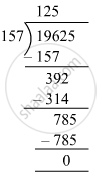Advertisements
Advertisements
Question
19625 trees have been equally planted in 157 rows. Find the number of trees in each row.
Solution
Number of trees planted in 157 rows = 19625
Trees planted in 1 row = 19625 ÷ 157

∴ 125 trees are planted in each row.
APPEARS IN
RELATED QUESTIONS
Evaluate :
15 x 49372
State if the following statement is true?
`(a – b) ÷ c = a/c-b/c`
Write the predecessor of: 7684320
Complete the following magic square by supplying the missing numbers:
| 16 | 2 | |
| 10 | ||
| 4 |
Replace each * by the correct digit in the following:
\[\begin{array}{r}
&\texttt{9 1 7}\\
-&\texttt{* 5 *}\\
\hline
&\texttt{5 * 8}
\end{array}\]
Fill in the blanks to make the following a true statement:
1369 × 0 = .......
The product of two whole numbers is zero. What do you conclude?
Find the value of: 981 + 5720 ÷ 10
Divide the largest 5 digit number by 653. Check your answer by the division algorithm.
The cost price of 23 colour television sets is Rs 570055. Determine the cost price of each TV set if each costs the same.
What least number should be added to 10056 to get a number exactly divisible by 23?
The sum of two odd numbers is
The value of (89 × 76 + 89 × 24) is
Which of the following is not zero?
Match the following columns on whole numbers:
| Column A | Column B |
| (a) 137 + 63 = 63 + 137 | (i) Associativity of multiplication |
| (b) (16 × 25) is a number | (ii) Commutativity of multiplication |
| (c) 365 × 18 = 18 × 365 | (iii) Distributive law of multiplication over addition |
| (d) (86 × 14) × 25 = 86 × (14 × 25) | (iv) Commutativity of addition |
| (e) 23 × (80 + 5) = (23 × 80) + (23 × 5) | (v) Closure property for multiplication |
The whole number that does not have a predecessor is
Sum of two whole numbers is always less than their product.
______ is a factor of every number.
All whole numbers are natural numbers.
